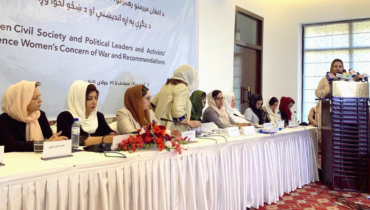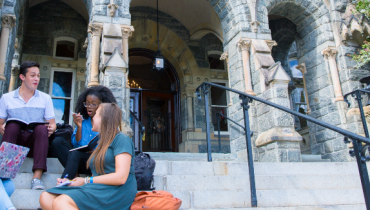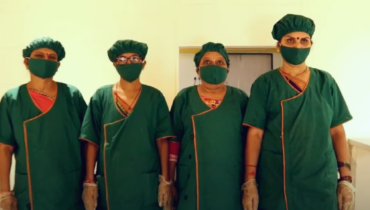Vian Dakheel Saeed, the only Yazidi Member of the Iraqi Parliament, traveled to New York to discuss the plight of Yazidi women and girls at the Sixth Annual Women in the World Summit on April 23, 2015. The three-day conference, presented by Tina Brown Live Media in association with the New York Times, addressed a wide range of issues affecting women around the world. Panelists at the event shed light on what lures women to Jihad, how women are fighting online harassment, the inequity in heart disease research, the rise of maternal mortality in the U.S., the impending climate refugee crisis, and a host of other topics.
MP Saeed spoke on a panel entitled “The Siege on the Mountain.” In August 2014, ISIS massacred an estimated 5,000 men on Mount Sinjar and took 7,000 Yazidi women as sex slaves. The Yazidis are a religious minority found in Iraq, northern Syria and the Caucasus, who are targeted because of their faith—a melding of Zoroastrianism and Islam.Iraqi NGOs reported that the older Yazidi women were sold into slavery, while girls and younger women were betrothed to ISIS fighters as a reward.
While the siege of Mount Sinjar has ended, 50,000 Yazidi refugees and internally displaced persons are struggling in its aftermath. Thousands of Yazidi women and girls have been sold by ISIS and remain missing. MP Saeed described that there is not enough food, water or adequate healthcare for the 420,000 displaced persons in the Kurdistan region, and that approximately 5,000 Yazidis—women, men, and children—have been kidnapped by ISIS since the summer of 2014. Of the kidnapped, 3,000 are women, and 700 are children between the ages of four and 10 years old. ISIS has also targeted MP Saeed for her political activism, but Saeed passionately asserted, “I am not thinking about my life, I am thinking how can I help those people…the Yazidis in Iraq. My life is nothing… how can these small girls, maybe nine or 10 years old, be [raped by ISIS], every day?” She recently addressed the UN Security Council in late March 2015 to draw attention to this issue: “We are being slaughtered, our girls are being sold, our children are being taken,” she said.
On the panel, MP Saeed was joined by her sister, Dr. Delan Dakheel Saeed, who works with girls abducted by ISIS, as well as Ambassador Melanne Verveer, Director of the Georgetown Institute for Women, Peace and Security; Alissa Johannsen Rubin, Paris Bureau Chief for the New York Times; and moderator Deborah Roberts, ABC News Correspondent.
Ms. Rubin shared that, regrettably, “A lot of us did not realize quickly enough what was happening [when the crisis first unfolded]. We should have been more alert [to] how vulnerable [the Yazidis] were.” While many became aware of what occurred on Mount Sinjar, the international community has only recently begun to understand “how women and girls were raped as a weapon of war,” identified moderator Roberts. Ambassador Verveer acknowledged that sexual violence in conflict is “a horrific problem” and is used “as a strategic tactic of war.” Amb. Verveer further noted that the international community has banned biological and chemical weapons and adopted an agreement on nuclear weapons, “but somehow sexual violence is still viewed as normal or expected… and it’s horrible.”
In addition to the sexual violence committed against the kidnapped Yazidi women, some girls and women were offered for sale to their own family members to raise revenue for the extremist group. In one harrowing tale, MP Saeed shared that a man called her asking for her help. Someone from ISIS had contacted him and told him that he could buy back his eleven-year-old daughter if he had $2,000. He did not have the money. The man, heartbroken and desperate, asked MP Saeed, “What can I do? I need to buy back my daughter because I lost my wife, I lost my family…I have lost all my daughters…”
The girls who are able to escape, whether they have run away or were bought and released, need assistance when they return. Dr. Saeed stressed that rape is very serious in their culture—women and girls who have been raped are stigmatized and may be subjected to honor killings by their own families and communities, and children born of rape are often treated as illegitimate.
Beyond the trauma and shame associated with being a survivor of rape, escaped women and girls must confront the memories of watching family members and friends who were killed and raped in front of them. MP Saeed called upon the international community to support the establishment of centers to help the escaped girls reintegrate into society and heal from the physical and psychological trauma that they have endured.
“There are perils to our indifference,” Ambassador Verveer emphasized. “When you hear these stories [you have to ask], is anyone there for [these women and girls]? We have to be the ones who are there for them.” Ambassador Verveer highlighted the importance of providing therapy for the survivors, as well as opportunities for girls to learn new skills so they “have something to move forward with [in] their lives.” Amb. Verveer also underscored the importance of holding our governments accountable, as well as international agencies. She noted that governments have signed on to UN Security Council Resolution 1325 (2000), which “focuses on the role of women in peace and security…and has two major pillars: Protection—that’s what we’re talking about, and participation. And we are far from realizing those goals.”


